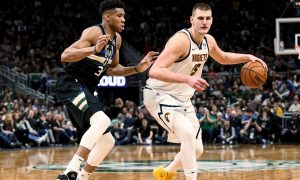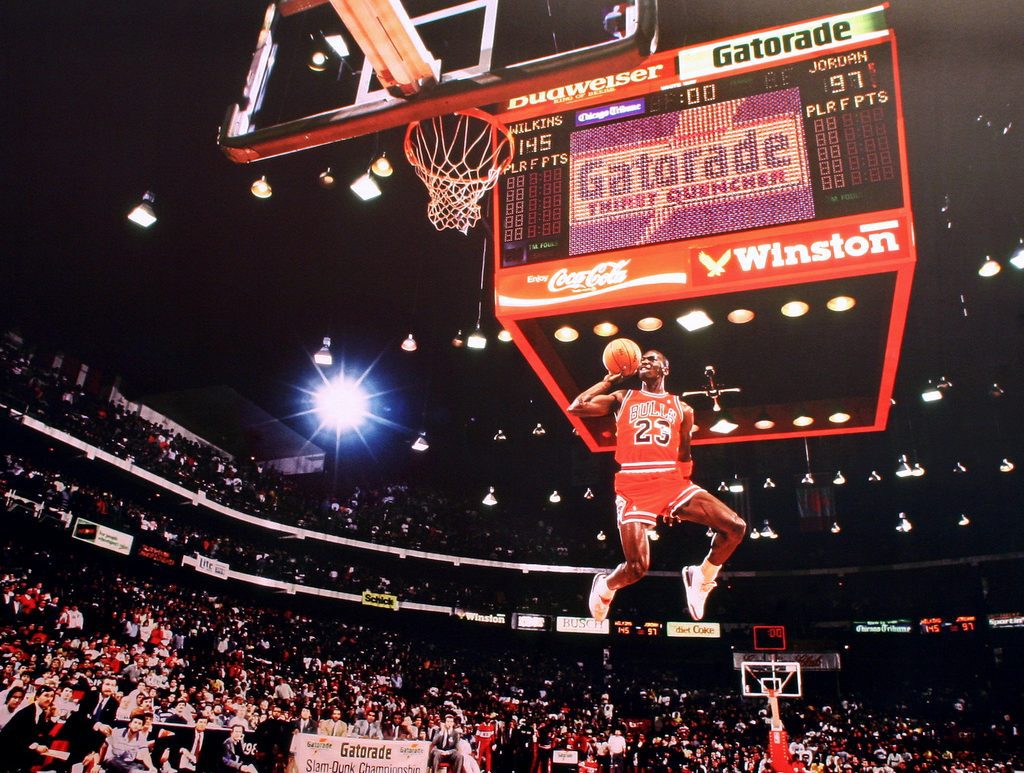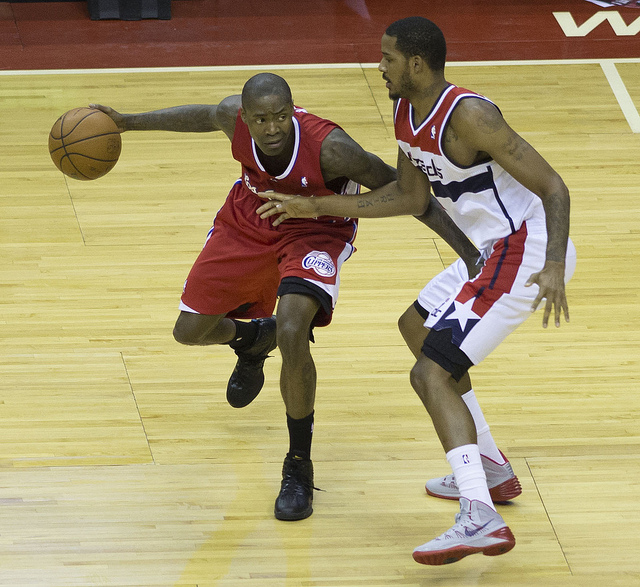
Image courtesy of Keith Allison/Flickr
You’ve heard the phrase “hindsight is 20/20,” right? Well, as is the story with most forms of history, the NBA Draft is a perfect opportunity for someone like me to come along and exercise 20/20 vision in hindsight. Unfortunately for the individuals who spend their time and make a living making franchise altering decisions for professional sports teams, they don’t have that luxury at the times they need it most. Year after year the NBA Draft proves to be a complete and total mystery. There is no science to it. It’s essentially a casino game. Sure, there is some element of skill and preparation that could play into your level of success, but that success is so strongly based on luck that it doesn’t even seem fair.
Since countless general managers, team presidents and other important decision-makers have lost their jobs because of these poor choices, and likely spend their days beating themselves over it, I took it upon myself to go back in time to 2000 and work my way up through 2013, figuring out the ideal draft pick for every team picking in the top-five. Sure, it’s kind of cruel to rub a little salt on their wounds, but given the time of the year it’s definitely appropriate.
2000
1: New Jersey Nets – Jamal Crawford (8th overall selection)
2: Vancouver Grizzlies – Kenyon Martin (1)
3: Los Angeles Clippers – Michael Redd (43)
4: Chicago Bulls – Hedo Turkoglu (16)
5: Orlando Magic – Mike Miller (5)
Had Kenyon Martin been able to stay reasonably healthy over his career, maybe he would’ve remained the first overall pick. The Martin-Jason Kidd tandem was good enough to get the Nets to back-to-back NBA Finals in the early 2000s, its shelf life just wasn’t long enough for my liking. I prefer the longevity of Crawford over Martin. The story is similar for Michael Redd, a second-round steal back in 2000. He played at a high enough level for five seasons in the middle of his career that he actually grabbed a spot on the 2008 USA Basketball Team.
Other Notables: Stromile Swift (2), Darius Miles (3), Marcus Fizer (4), Quentin Richardson (18), Jamaal Magloire (19), DeShawn Stevenson (23)
2001
1: Washington Wizards – Pau Gasol (3)
2: Los Angeles Clippers – Tony Parker (28)
3: Atlanta Hawks – Zach Randolph (19)
4: Chicago Bulls – Joe Johnson (10)
5: Golden State Warriors – Gilbert Arenas (30)
That’s a pretty good top-five right there. All five guys made at least two All-Star games. Thirteen years after the fact it’s still hard to believe that the Washington Wizards—looking for a franchise big man—passed on one of the most gifted post scorers in NBA history (Gasol) for the immortal Kwame Brown. Again, that’s hindsight for you. Another international player (Parker) joins Gasol atop the revisionist history draft board. The Gasol-Parker debate is an interesting one, as is the debate for how the rest of the top-five should have played out. Randolph and Johnson have both been consistent contributors for a decade and fringe-franchise guys, but Atlanta was in dire need of frontcourt help at the time. Golden State grabbed Arenas with the 30th pick in 2001, but I would opt to take him at No. 5 over Jason Richardson.
Other Notables: Kwame Brown (1), Tyson Chandler (2), Eddy Curry (4), Jason Richardson (5), Shane Battier (6), Richard Jefferson (13), Gerald Wallace (25), Mehmet Okur (37)
2002
1: Houston Rockets – Yao Ming (1)
2: Chicago Bulls – Amar’e Stoudemire (9)
3: Golden State Warriors – Carlos Boozer (34)
4: Memphis Grizzlies – Caron Butler (10)
5: Denver Nuggets – Tayshaun Prince (23)
Even though Ming’s career was cut short by a never-ending stream of foot injuries, his global outreach was too much to pass up on. The Houston Rockets still have a loyal fan base in Asia to this day and Ming is one of the great ambassadors in basketball. Stoudemire is the easy second choice, though like Ming his career has been hindered by some unfortunate injuries. It seems like most people tend to forget how good Stoudemire was at his peak. Boozer is fading out of relevancy now, but he spent the majority of career averaging right around a double-double. Butler and Prince is an interesting debate for the fourth pick, but I gave Butler the edge because it’s unclear what kind of player Prince would’ve been if he hadn’t fell into a rather lush situation in Detroit.
Other Notables: Jay Williams (2), Mike Dunleavy (3), Drew Gooden (4), Nikoloz Tskitishvili (5), Nene (7), Luis Scola (55)
2003
1: Cleveland Cavaliers – LeBron James (1)
2: Detroit Pistons – Carmelo Anthony (3)
3: Denver Nuggets – Dwyane Wade (5)
4: Toronto Raptors – Chris Bosh (4)
5: Miami Heat – David West (18)
LeBron James is the clear choice at the top and even if people in the Cavaliers organization would’ve been able to foresee the future “Decision” they would still would have taken him 100 times out of 100. Wade was almost the choice at No. 2 and if we’re ranking careers, he’s clearly second in line behind James, but one of the most popular NBA Draft related ‘What If’s’ is “what if the Pistons would’ve picked Anthony with the second pick instead of Darko Milicic?” There is reason for that. Even though Anthony and then-Pistons head coach Larry Brown clashed during the 2004 Summer Olympics, I don’t buy the fact that Carmelo couldn’t have been the starting small forward on that team. Prince be damned, I’m taking Anthony with the second pick. Who knows how different we might view Anthony if he put up 80 percent of the individual numbers he has put up, but consistently was making deep runs in the Playoffs with those loaded Pistons teams.
Other Notables: Darko Milicic (2), Chris Kaman (6), Kirk Hinrich (7), Boris Diaw (21), Mo Williams (47), Kyle Korver (51)
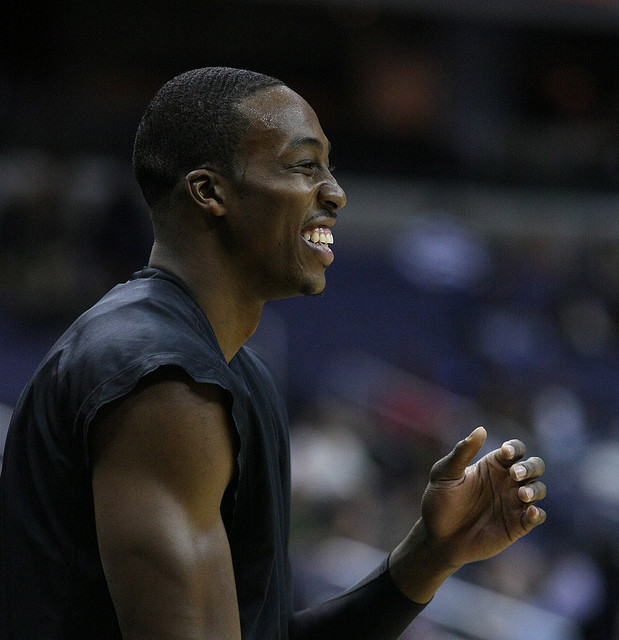
Image courtesy of Keith Allison/Flickr
2004
1: Orlando Magic – Dwight Howard (1)
2: Charlotte Bobcats – Al Jefferson (15)
3: Chicago Bulls – Luol Deng (7)
4: Los Angeles Clippers – Andre Iguodala (9)
5: Washington Wizards – Josh Smith (17)
Dwight Howard remains the No. 1 selection and Charlotte still picks their center of the future with the second pick, but it’s not Emeka Okafor. Instead, they get a nine-year head start on the Al Jefferson experience. Jefferson has never been able to anchor a defense like peak Howard did, but he’s still the best post-scoring option in the NBA today. Even though Luol Deng isn’t even a Bull anymore, it just feels like he should be one. He’s supposed to be in the red and black. The Bulls grabbed Ben Gordon at No. 3 and Deng at No. 7. I’m sure they wouldn’t wait around and see if they could steal him with the seventh pick if we ran this draft back. Josh Smith’s 2013-14 campaign in Detroit soured me so badly that I gave Iguodala the edge over him for the fourth pick.
Other Notables: Emeka Okafor (2), Ben Gordon (3), Shaun Livingston (4), Devin Harris (5), J.R. Smith (18), Tony Allen (25), Anderson Varejao (30)
2005
1: Milwaukee Bucks – Chris Paul (4)
2: Atlanta Hawks – Deron Williams (3)
3: Utah Jazz – Monta Ellis (40)
4: New Orleans Hornets- Andrew Bogut (1)
5: Charlotte Bobcats – David Lee (30)
Remember back in 2008 when Chris Paul or Deron Williams was an actual debate? Seems like an eternity ago. Paul is the easy choice for the first pick now and he should’ve been back in 2005. Bogut was regarded as a potential franchise center but the notion that Milwaukee would favor T.J. Ford over Paul still seems wacky. Williams is an easy second pick, like he or Paul should’ve been at the time. The Hawks badly needed a point guard and instead chose University of North Carolina sixth man Marvin Williams. No wonder Philips Arena is routinely half-filled with visiting teams’ fans. Since Utah would miss out on Williams, Monta Ellis would’ve been a suitable third pick. He’s plenty capable of logging huge minutes and has scored at least 19 points per game for the last seven seasons. Andrew Bogut makes sense in New Orleans, as does David Lee in Charlotte.
Other Notables: Marvin Williams (2), Raymond Felton (5), Andrew Bynum (10), Danny Granger (17), Nate Robinson (21), Jarrett Jack (22)
2006
1: Toronto Raptors – Rajon Rondo (21)
2: Chicago Bulls – LaMarcus Aldridge (2)
3: Charlotte Bobcats – Paul Millsap (47)
4: Portland Trail Blazers – Rudy Gay (8)
5: Atlanta Hawks – Kyle Lowry (24)
Even though Rajon Rondo cruelly put Chris Bosh on a poster in 2010, that was after Bosh was already in Miami. I’ll assume that a Rondo-Bosh tandem in Toronto could’ve worked out. Chicago took Aldridge with the second pick in 2006 (smart!), but quickly traded him for the fourth overall pick Tyrus Thomas (not smart!). I’ll assume Aldridge stays in the Windy City this time around. Paul Millsap moves up from the mid-second round to get selected third by Charlotte, who could’ve went elsewhere with this pick if they would have taken my advice in 2005 and drafted David Lee. Portland gets the shaft when they lose Aldridge and instead have to settle for several thousand long two-pointers from Rudy Gay. Atlanta, still searching for that elusive point guard, should have taken Lowry, who just now is starting to get the respect he deserves as a high quality point guard.
Other Notables: Andrea Bargnani (1), Adam Morrison (3), Tyrus Thomas (4), Shelden Williams (5), Brandon Roy (6), J.J. Redick (11)
2007
1: Portland Trail Blazers – Kevin Durant (2)
2: Seattle SuperSonics – Joakim Noah (9)
3: Atlanta Hawks – Al Horford (3)
4: Memphis Grizzlies – Marc Gasol (48)
5: Boston Celtics – Mike Conley (4)
Durant is the easy first overall pick for 2007 and even at the time I thought that was the case. I don’t think anyone who backed Durant at the time expected it to be such a landslide over actual first overall selection Greg Oden, though. Reigning Defensive Player of the Year Joakim Noah works well as the second overall pick in the draft, with his Florida Gators teammate Al Horford following him. Marc Gasol wouldn’t become a member of the Grizzlies until the Lakers acquired Pau Gasol halfway through the 2007-08 regular season. Instead, the Grizzlies took Mike Conley with the fourth selection, a pick that has proved to be very successful. Since we’re assuming that everything outside of the draft remains the same, Mike Conley would’ve ended up going from Boston to Seattle in exchange for Ray Allen.
Other Notables: Greg Oden (1), Jeff Green (5), Thaddeus Young (12), Nick “Swaggy P” Young (16), Arron Afflalo (27)
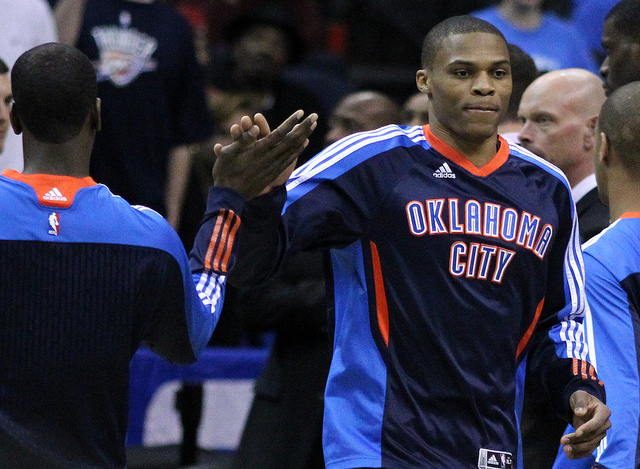
Image courtesy of Keith Allison/Flickr
2008
1: Chicago Bulls – Russell Westbrook (4)
2: Miami Heat – Derrick Rose (1)
3: Minnesota Timberwolves – Kevin Love (5)
4: Seattle SuperSonics – Serge Ibaka (24)
5: Memphis Grizzlies – Brook Lopez (10)
Chicago fans will probably want to put me in a guillotine for taking Russell Westbrook over Derrick Rose, but there is no guarantee that Derrick Rose is ever Derrick Rose again. Even if he is, the distance between he and Westbrook isn’t that wide. In fact, I think if the two would’ve switched roles from the time they got drafted in 2008, Westbrook could’ve put together an MVP caliber season just like Rose did in the 2010-11 season. Kevin Love gets picked third by Minnesota, cutting out a Love-O.J. Mayo swap. Serge Ibaka would go fourth overall to Seattle—soon to be Oklahoma City—20 spots higher than he actually went. At this point Memphis didn’t realize that Marc Gasol would be anything more than Pau’s chubby younger brother, so Brook Lopez makes sense with the fifth overall pick.
Other Notables: Michael Beasley (2), O.J. Mayo (3), Danilo Gallinari (6), Roy Hibbert (17), Nicolas Batum (25), DeAndre Jordan (35), Goran Dragic (45)
2009
1: Los Angeles Clippers – Blake Griffin (1)
2: Memphis Grizzlies – James Harden (3)
3: Oklahoma City Thunder – Stephen Curry (7)
4: Sacramento Kings – DeMar DeRozan (9)
5: Minnesota Timberwolves – Ty Lawson (18)
At the time, the 2009 draft class was considered to be a pretty weak crop of players. Five years later, three of the top 12 players in the league are from that 2009 class. Griffin is extremely marketable and arguably the best power forward in the league. You can make those same arguments for Harden and Curry when it comes to their respective positions. Though I would rank Curry higher than Harden, Harden to Memphis is too perfect a fit. Oklahoma City should’ve grabbed Curry at No. 3, allowing both he and Westbrook to spend more time off the ball than they are each afforded now. Ty Lawson to Minnesota at No. 5 is the pick that intrigues me. The Wolves drafted point guards with the fifth and sixth picks, a curious call at the time that likely wouldn’t be as controversial if they selected the two best point guards in the draft, Curry and Lawson. Rubio is serviceable but incredibly limited as a scorer and Jonny Flynn hasn’t played in the NBA since 2012. Lawson would be an upgrade over either.
Other Notables: Hasheem Thabeet (2), Tyreke Evans (4), Ricky Rubio (5), Jrue Holiday (17), Jeff Teague (19), Taj Gibson (26), Danny Green (46)
2010
1: Washington Wizards – Paul George (10)
2: Philadelphia 76ers – John Wall (1)
3: New Jersey Nets – DeMarcus Cousins (5)
4: Minnesota Timberwolves – Eric Bledsoe (18)
5: Sacramento Kings – Greg Monroe (7)
With a smaller body of work to evaluate the picks start to become a little more difficult to make. Paul George makes the strongest “franchise player” case of anyone in this draft, so he moves up to No. 1. John Wall only slips one spot down to Philadelphia. Cousins slipped to the fifth overall pick back in 2010 because of worries that he was nuts. That he is, but it’s tolerable because he has been so productive on the court thus far in his career. Ricky Rubio was still playing in Europe and there wasn’t a guarantee that he would be coming to the NBA any time soon. The Jonny Flynn experience wasn’t exactly a hit, so picking Bledsoe fourth makes sense in hindsight. Sacramento gets Monroe with the fifth pick, a drop off from Cousins but he’s not nearly as crazy.
Other Notables: Evan Turner (2), Derrick Favors (3), Wesley Johnson (4), Gordon Hayward (9), Larry Sanders (15), Lance Stephenson (40)
2011
1: Cleveland Cavaliers – Kawhi Leonard (15)
2: Minnesota Timberwolves – Kyrie Irving (1)
3: Utah Jazz – Klay Thompson (11)
4: Cleveland Cavaliers – Kenneth Faried (22)
5: Toronto Raptors – Chandler Parsons (38)
Maybe I’m a prisoner of the moment, but if I’m in charge of re-drafting the last 14 drafts then I’m taking Kawhi Leonard first in 2011. It’s really easy to say that he’s a system guy and wouldn’t be as impactful outside of San Antonio, but it’s also easy to say that Kyrie Irving has a 64-117 record in the NBA. He puts up good numbers and stars in cool commercials, but he’s barely won 35 percent of his games. Klay Thompson is the third overall pick to Utah, which means the Warriors and Timberwolves wouldn’t currently be locked in a game of chicken over pulling the trigger on a Kevin Love trade. I prefer Kenneth Faried over Chandler Parsons as the fourth pick for Cleveland, though you could go either way. In this alternate reality, had Cleveland taken Leonard first overall, they probably don’t take Parsons fourth. They have their small forward of the future already.
Other Notables: Derrick Williams (2), Enes Kanter (3), Tristan Thompson (4), Jonas Valanciunas (5), Kemba Walker (9), Nikola Vucevic (16), Jimmy Butler (30), Isaiah Thomas (60)
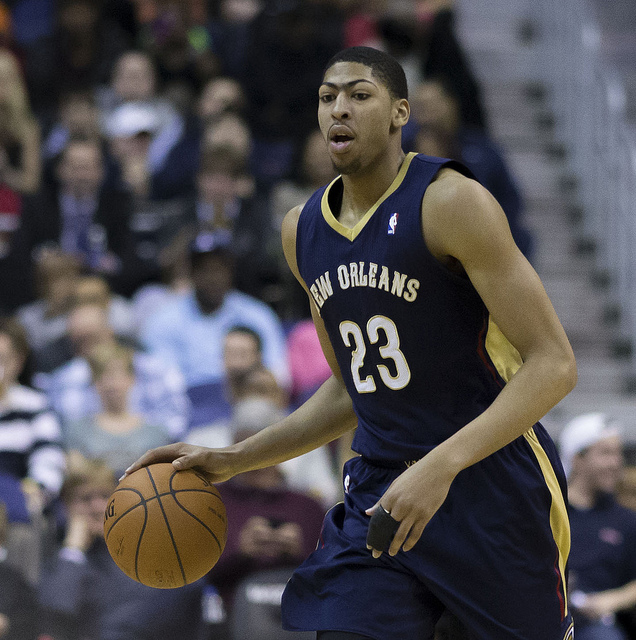
Image courtesy of Keith Allison/Flickr
2012
1: New Orleans Pelicans – Anthony Davis (1)
2: Charlotte Bobcats – Damian Lillard (6)
3: Washington Wizards – Bradley Beal (3)
4: Cleveland Cavaliers – Andre Drummond (9)
5: Sacramento Kings – Draymond Green (35)
Davis and Lillard are an easy one-two combo atop the draft board. Davis is a complete freak of an NBA player and already looks like one of the best No. 1 overall picks in recent memory. Sooner or later, Davis will supplant James and Durant atop the league. It’s only a matter of time. Lillard slipped further than he should have because of the concerns about the quality of the competition he faced at Weber State and because he stayed all four years in college, meaning he was three years older than someone like Bradley Beal, who came out for the NBA Draft after his freshman season at Florida. Still, Lillard is a special talent and shown on a big stage that he won’t shy away from big moments. Beal has come along nicely as well, a nice complimentary piece aside John Wall in the Wizards backcourt. Drummond was raw coming out of Connecticut and an even worse free-throw shooter then than now. As you’ll see below, the fifth pick could be about five or six different guys. Draymond Green does all of the dirty work and seemed like he could be a legitimate piece to a contending team in Golden State’s first Round series against the Clippers this past postseason.
Other Notables: Michael Kidd-Gilchrist (2), Dion Waiters (4), Thomas Robinson (5), Harrison Barnes (7), Terrence Ross (8), Moe Harkless (15), Jared Sullinger (21)
2013
1: Cleveland Cavaliers – Victor Oladipo (2)
2: Orlando Magic – Michael Carter-Williams (11)
3: Washington Wizards – Giannis Antetokounmpo (15)
4: Charlotte Hornets – Tim Hardaway, Jr. (24)
5: Phoenix Suns – Mason Plumlee (22)
It’s way too early to tell, but I think we can all agree Anthony Bennett probably doesn’t get picked first overall. I still maintain the belief that Victor Oladipo will be the best player of this very weak class. The reigning Rookie of the Year would be the second overall selection. In Giannis Antetokounmpo, Washington would get a small forward with infinitely more upside than Otto Porter. And I figured why not be nice and pair the Plumlee’s together in Phoenix, so then the Morris twins weren’t the only set of siblings in the desert.
Other Notables: Anthony Bennett (1), Otto Porter (3), Cody Zeller (4), Alex Len (5), Ben McLemore (7), Trey Burke (9), Gorgui Dieng (21)


